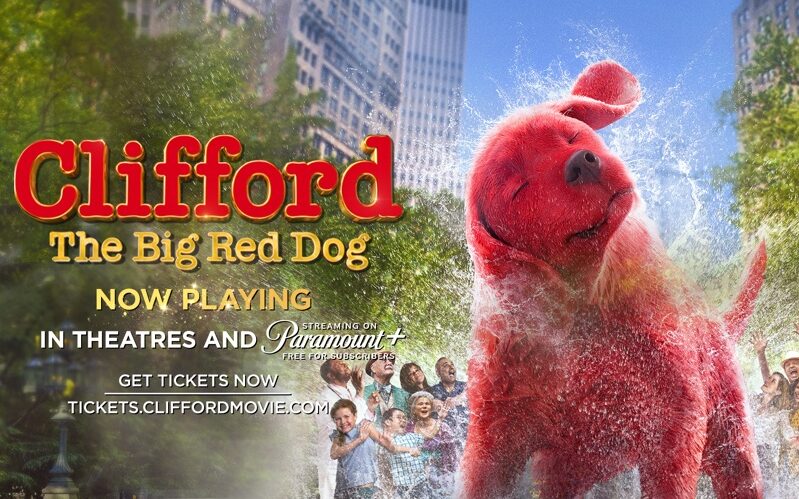How does the film stack up to the storybook?
Hey look, here is a film based on a story only 32 pages long with fewer words than this article will have. Is that opportunity for easiness knocking?
The storybook
This is a storybook made for kids written by Norman Bridwell. It doesn’t try to explore deep-seated ambitions, struggles or triumphs/failures of humanity; it just tries to tell a fun story about a little girl explaining the upkeep, and pros/cons of her rather unusual pet. There it succeeds.
Written in easy-to-understand prose similar to “Dick and Jane”, though far less repetitive, this tells the day-to-day routine of owning a small pink whale — I mean a big red dog, apparently. The illustrations on each page are quite cartoony with a silly charm. The only glaring image that still festers in my mind is the shape of its lead, Emily Elizabeth’s nose which is either that of a shriveled pear or butternut squash, I’m not quite sure.
Emily Elizabeth plays hide-and-seek with Clifford, has a tea-party with Clifford and grooms Clifford for a dog show in which they only win second place (which is still immensely fairer to Clifford than the 2017 Grammy awards were to any and every singer who wasn’t Beyonce or Adele). Clifford lives in a doghouse five times bigger than Emily Elizabeth’s family home, chases cars and certainly lives up to his name.
Review: 3/5
The film
Okay, if you’ve seen the trailers you know this film is no “Citizen Kane”, the film everybody considers perfect, but nobody has ever seen (if they did, then Rotten Tomatoes critics would realize how similar to Charles Foster Kane they actually are). This reminded me of two other family films concerning animals I covered for Stack-Up last year; those being “The Call of the Wild” which wasn’t half-bad, featuring a CGI dog and a committed Harrison Ford who seemed to enjoy the shoot, and “Dolittle” — an awful, vile film which probably culminated in Robert Downey Jr. having a long, sad discussion with his agent (or the other way around because the most despicable aspect of the film was RDJ’s idea — look it up). This was better than the latter but not as good as the former.
I was pleasantly surprised by the outcome of this one. The story concerns Emily Elizabeth receiving a magic (yes, magic) puppy from mysterious Mr. Bridwell (John Cleese) who tells her that her love will make the dog grow. Since her bumbling but caring uncle tells her they can only keep the dog for one night due to apartment regulations, she tearfully wishes he will grow bigger and well, we now have rising action.
Naturally, this attracts the attention of a cruel scientist leading to a wild goose chase, or mutt-chase (you classify what breed Clifford is) and finishing with Emily Elizabeth giving a climactic speech expressing we need to look past and love each other despite the differences we may have (AKA every moral in every film released current era).
Of course, finding a PG-rated family film without needless crude humor is as rare as finding a Maroon 5 song that’s not sex-obsessed in nature. Maybe I’m pretentious, but I made a shocking discovery that I’m above finding urine jokes funny anymore. My biggest problem was how disproportionate Clifford’s body was while still a puppy, with its head being smaller than the rest of its form. It reminded me of Rick Moranis’ at the end of “Strange Brew” where he drinks a tank of beer and his body is enormously bloated with his head retaining its normal shape (no, I don’t consider “Strange Brew” of any higher or lower quality than “Clifford”). It’s a fun family movie, nothing more or less.
Review: 2.5/5
In the book, Clifford tries to fetch a stick and retrieve a baton with the police officer. I can understand how that wouldn’t much work in a film today because of society, so they swap it with a person running in an air bubble (kind of like a joke pulled in “The Meg” only less dark). Now, I don’t get out too much from my dingy, ground-level apartment but do people casually run around in inflatable bubbles as often as this film claims they do?
